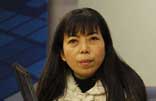Bringing up babies in various ways
Updated: 2012-02-16 08:02
By Berlin Fang (China Daily)
|
|||||||||||
Let me start with a disclaimer: I didn't write this to promote a book. I am not even an American mother. However, recently Pamela Druckerman, author of Bringing Up Bb, published an article in the Wall Street Journal saying French moms are superior because of their ability to cultivate such characteristics as discipline, patience, enjoyment and delayed satisfaction in their children.
As a Chinese parent bringing up two young children in the United States, I am always fascinated by such comparisons of parenting. I am also driven to study other parenting methods by self-doubt: am I doing the right thing for my two kids? Such doubt, unless carried to the extreme, ought to be healthy. What do we know about the complex process of growing up? Very little, really. If someone says he or she has got the secrets, watch your wallet.
It is no coincidence that you read such controversial articles about Chinese and French parenting in a US newspaper and that books about French or Chinese parenting sell well. This is because many American mothers are willing to reflect on how they are raising their kids and what they are not doing right. In fact Druckerman is an American mom. So is Amy Chua, who is fundamentally an American mom in the disguise of a Chinese one.
If Chua were indeed a middle-class Chinese mom, she should have one kid and the help of several in-laws and probably a nanny in raising that one child. Instead she is practicing American motherhood by raising two daughters while being a Yale law professor and a best-selling author.
Coming from China where most young moms cannot raise their own kids independently, I am often surprised by the American mom who is energetic enough to raise three or four kids. It also amazes me that they are seen in public only three or four days after childbirth. A Chinese mom needs to stay inside and rest a whole month while being fed by her parents or husband.
I also respect American moms who are willing to make sacrifices for their children when their careers and children come into conflict. Many of my American colleagues turned their full-time jobs into part-time jobs when their child was born, and some stay at home primarily to raise their children.
Most American moms are also intensely involved in their children's education. They help with take-home projects, organize events for the school, read stories to their children at bedtime, take them to libraries, bookstores, concerts, camps and all sorts of extracurricular activities they perceive might help their children develop as persons. Many middle-class Chinese moms engage little with their children's education, other than paying someone to teach piano or math or English, preferring instead to weep over South Korean dramas on TV.
Many Chinese moms learn from their parents, neighbors, or colleagues about the "right" way to bring up children. Such advice can consist of superstitions, misinformation or simply old-wives tales. Experts and expertise are neither consulted nor trusted.
I admit it is hard to compare without drawing generalizations. Individual styles may be more important than national differences. My own mom, for instance, was capable of raising seven children through hard times while a middle-class Chinese mom today may require seven helping adults to raise a single child.
But I think we need a wakeup call as a nation if we are to raise kids able to adapt to the future.
Focused on uniform exams, Chinese parents have a tendency to ignore the individual differences in children. I see American moms as ferocious learners, trying to figure out what works and doesn't work for their children based on their kids' personalities.
I hope we Chinese parents will boast less about our parenting success, and instead ask ourselves what each of our children needs to develop as a person and how we can become part of a nurturing environment that best suits their needs.
The author is a US-based instructional designer, literary translator and columnist writing on cross-cultural issues.
(China Daily 02/16/2012 page8)




